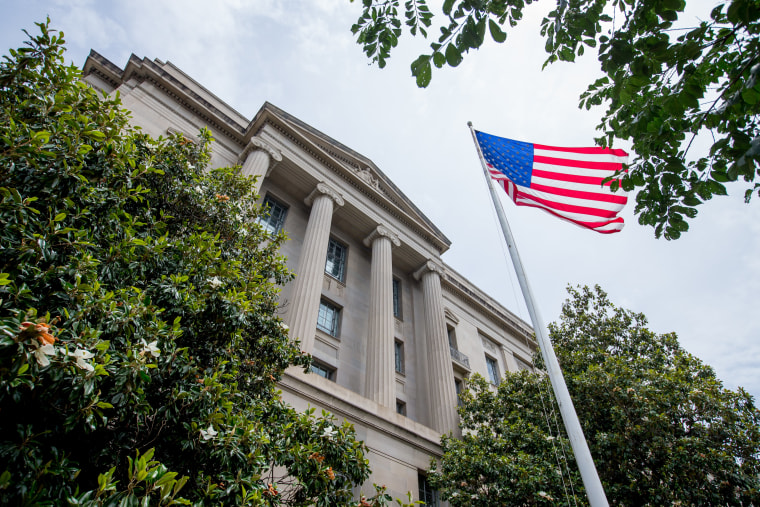On the same day President Donald Trump tweeted that the U.S. military will no longer “accept or allow” transgender people to serve, the LGBTQ community was dealt another blow when the Department of Justice (DOJ) submitted an amicus brief opposing the extension of Title VII discrimination protections on the basis of sexual orientation.
The brief was submitted in the Second Circuit case of Zarda v. Altitude Express. The plaintiff in that case, Donald Zarda, alleges he was unlawfully fired for being gay. The Justice Department's brief argues that Title VII of the Civil Rights Act of 1964, which prohibits discrimination on the basis of race, color, religion, national origin and sex, does not protect Zarda from this form of discrimination.

“The United States submits that the en banc Court should reaffirm its settled precedent holding, consistent with the longstanding position of the Department of Justice, that Title VII does not reach discrimination based on sexual orientation,” the brief reads.
“The sole question here is whether, as a matter of law, Title VII reaches sexual orientation discrimination. It does not, as has been settled for decades. Any efforts to amend Title VII’s scope should be directed to Congress rather than the courts," the brief continues.
The Equal Employment Opportunity Commission (EEOC), an independent federal agency tasked with enforcing federal anti-discrimination law, has already filed a brief in support of the plaintiff. The Justice Department has therefore created a split in the federal government’s position on the same case.
Whether Title VII should be understood to include sexual orientation has been making its way through the courts. In April, the Seven Circuit Court of Appeals ruled in favor of educator Kimberly Hively, arguing that her employment termination due to her sexual orientation is in fact covered by Title VII protections. The Eleventh Circuit, by contrast, failed to reconsider the case of another woman, Jameka Evans, who also alleges employment discrimination on the basis of her sexuality and gender non-conformity. Lambda Legal is challenging this ruling, and it may be headed for the Supreme Court.
Related: Trump’s Tweets May Leave Transgender Service Members ‘In Harm’s Way’
Anthony Kreis, a professor at Chicago-Kent College of Law, said he was not surprised to read the Justice Department's current position on Title VII protections “just knowing what we know about [the administration’s position] on LGBT rights more broadly,” but he believes the brief lacks strong argumentation.
“In terms of the substance,” the brief’s argument that sex discrimination should be narrowly interpreted as unequal treatment between men and women “really ignores precedent and the history of how Title VII has be interpreted over time,” Kreis told NBC News.
The Justice Department's brief disputes the merit of the EEOC’s position on Title VII, but, according to Kreis, “The EEOC is, by far, a greater body of experts on Title VII than this handful of DOJ lawyers.”
The Justice Department also casts the position of the EEOC and the Seventh Circuit Court of Appeals as a break with precedent. However, Kreis noted this ignores how understandings of gender and sexuality have changed in both popular culture and in law. Many of the decisions the Justice Department relies upon came before landmark cases such as Lawrence v. Texas and Obergefell v. Hodges, rulings that decriminalized sodomy and legalized same-sex marriage, respectively.
Further, Kreis called the brief’s contention that the onus is on Congress to amend the Civil Rights Act to explicitly include sexual orientation “incredibly disingenuous,” as Congress has had time to respond to the Seventh Circuit’s ruling.
“There are bills before Congress to protect LGBT persons, but no legislation to strip the ruling in Hively," Kreis added.
Related: Lesbian’s Workplace Discrimination Case May Be Headed to Supreme Court
Given the administration’s policy positions regarding the transgender community, most recently its decision on trans people serving in the military, there was concern the Justice Department's brief would also contest use of Title VII to protect against discrimination on the basis of gender identity. While the brief does not explicitly say Title VII should not be understood to include anti-transgender discrimination, Kreis noted that this logic is “strongly hinted at” due to the brief’s argument that Title VII is about “disparate treatment of men and women.”
“That is a prelude to saying Title VII is about biological sex, so it can’t protect transgender individuals. I think that is a signal,” Kreis said.
Overall, Kreis said the brief is “reflective of the change in administration, not of thoughtful analysis.”
Related: Trump Leaves Transgender Service Members 'in Harm's Way'
Omar Gonzalez-Pagan, a staff attorney at Lambda Legal, called the Justice Department's amicus brief “odd and incongruous” because of its break with legal precedent, other federal agencies and even its own track record. In 2014, former Attorney General Eric Holder issued a memorandum to the department that instructs the Justice Department to apply a more expansive understanding of Title VII to consider transgender status a protected characteristic.
“There is no role for the DOJ to play," Gonzalez-Pagan said of the Second Circuit's Zarda v. Altitude Express case. Instead, he argued, the Justice Department is “going out of its way to harm LGBT people” by inserting itself into a “case between private parties.”
“Ultimately, the government has already weighed in — the EEOC has already weighed in and sided with the plaintiff," he added.
Gonzalez-Pagan called the brief, a “political statement by the administration that has turned a blind eye to the equal rights of LGBT people.”
“It’s a sad day, really, for all of us, and a misuse of government resources," he concluded.
The Justice Department declined an NBC News request to elaborate on its amicus brief.
